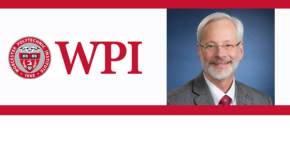 On Worcester Polytechnic Institute Week: Project-based learning can set students up for success outside of school.
On Worcester Polytechnic Institute Week: Project-based learning can set students up for success outside of school.
Kent Rissmiller, associate professor of social science, explores these benefits.
Kent Rissmiller completed studies in political science at Muhlenberg College (AB) and Syracuse University (PhD). Along the way, he also completed a JD at the University of New Hampshire Law School, where he worked in the Energy Law Institute. Professor Rissmiller also worked for three years as an attorney for the Public Service Commission of Nevada, where he was involved in setting rates and policies for electric and water utilities. At WPI, Professor Rissmiller teaches government, law, and public policy. He also directs the Pre-Law program and oversees the Law and Technology minor. One of his greatest joys has been seeing the success of his students who have gone on to graduate and law schools and become accomplished public policy and legal professionals. “WPI offers an excellent preparation for students interested in public service,” he says. “Our student’s scientific and technical competency is highly valued in policy and legal settings, where too many professionals lack the technical background to excel. For example, lawyers with an understanding of biology and physical chemistry can communicate with environmental experts. That’s important whether they are developing regulations or challenging the use of a potentially harmful pesticide. Currently, some of my students are trying to understand the chemistry and geology of hydrologic fracking–knowledge which is important to regulating that industry.
“Professor Rissmiller’s own research is in energy policy, and he has advised many student IQPs in the area. Studies have addressed the restructuring of the electric industry, energy conservation in hospitals, and the Green Communities Program in Massachusetts, among others. Since 2006, Professor Rissmiller has also served as associate dean of Interdisciplinary and Global Studies. In that capacity, he is also director of the Washington Project Center. “The Global Program is one of the best features of a WPI education,” he says. “It’s a tremendous experience for students and faculty.” Professor Rissmiller has advised students at project centers in Washington, London, Costa Rica, Puerto Rico, and Zurich.
Preparing Students with a Project-Based Curriculum
To prepare students for the challenges they’ll face in the working world, such as teamwork, critical thinking, and problem solving, higher education has been moving toward more holistic approaches involving high-impact practices including project-based and experiential learning. However, there’s still skepticism surrounding these styles of learning.
A recent study offered insight on how a project-based curriculum prepared graduates of a private university for success in the workforce through in-depth interviews with a wide range of employers. Participants claimed that a project-based curriculum is beneficial not only to the students who participate in it but to the employers who hire them as well.
Interview participants identified the key skills and abilities they look for in prospective employees, including problem solving, leadership, oral and written communication, collaboration, and self-motivation, and asserted that they view significant experience with project work as a proxy for many of those key skills and abilities, streamlining their recruiting efforts.
Employers also reported that graduates of a project-based curriculum require less on-the-job training and are more likely to rise quickly in the organization. As one participant explained, “When I can get someone in who doesn’t need to be hand-held in how they go about executing our project … that’s a real big help.”
Employers shared their desire for graduates with experience working on projects that are long-term, substantive, and authentic, exactly those that project-based learning can provide, as opposed to those that were seen merely as exercises or classroom assignments.
Of course, employer needs are not the only factor when designing a curriculum. However, this study revealed that employer interests align with a broad set of learning objectives valued by universities, such as problem-solving, teamwork, and communication. This suggests that project-based learning can prepare students for successful careers as well as meaningful lives.
